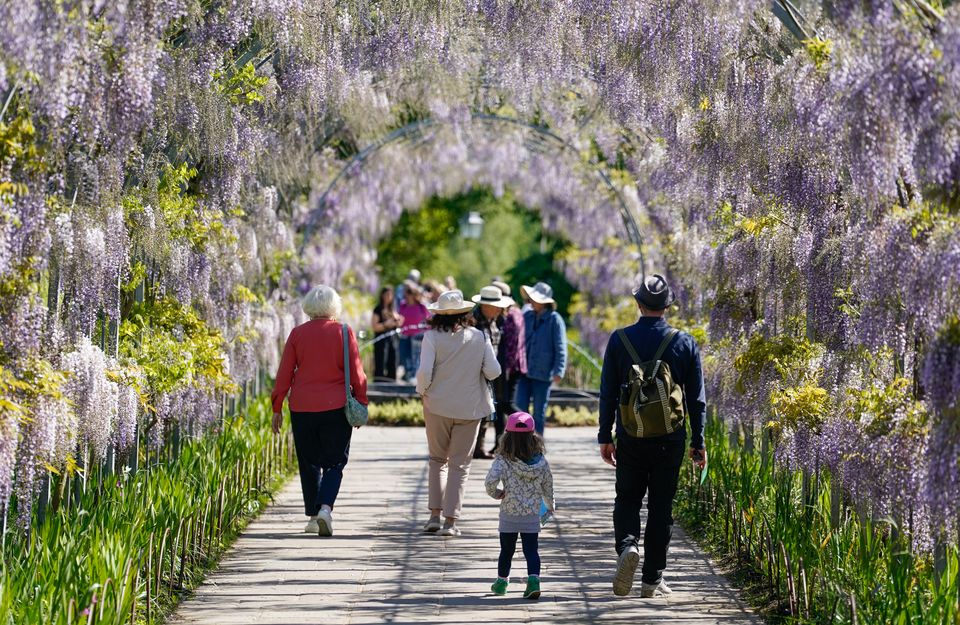The Royal Horticultural Society is calling for compensation for a road scheme it says has hit funding for environmental research and community work.
The RHS said it has lost £6 million as a result of the A3/M25 roadworks close to its flagship garden Wisley, in Surrey, with 350,000 fewer people visiting the site, and that losses will total £11 million by the time the scheme finishes in 2026.
Due to the losses, the RHS said it was delaying development of new arboretums at its gardens and the planting of 4,000 trees to investigate climate resilience and had significantly reduced funding for research into nature-based solutions for environmental challenges.
Visitor numbers are down 25% at Wisley, the RHS said (Andrew Matthews/PA)
It also warned it was cutting back on community outreach work and looking at training 10% fewer students at its gardens.
The call for compensation by the charity has been backed TV gardener Alan Titchmarsh, who said the losses were “catastrophic not only for the RHS but for the whole of the UK” and urged the Government to recognise the importance of horticulture.
The RHS pointed to polling of its members which found that 80% of those who visited Wisley less frequently in the last 12 months said it was because of the M25/A3 roadworks, and 63% of those who did not visit in the past year avoided the gardens for the same reason.
Titchmarsh and the RHS are urging people to sign a petition calling on the Government to recognise Wisley as a special case for compensation for the losses caused by the multimillion-pound National Highways scheme.
Titchmarsh said the £6 million could have created 15 NHS wellbeing gardens and brought gardening and nature to hundreds more schools, funded apprenticeships and supported scientific research into solutions for pollution, flooding and the biodiversity and climate crises.
“These losses are catastrophic not only for the RHS, but for the whole of the UK in terms of the incredible work the RHS does to help people and planet and educating and supporting millions of gardeners to garden more sustainably for a better future.
“Unlike others that failed before it, this Government must recognise the importance of horticulture, of gardeners and of the immense positive benefits gardens, gardening and growing plants can have on our health, the environment, wildlife and biodiversity to safeguard the future for generations to come,” he said.
He described Wisley as “one of our finest gardens”, while the RHS said it had one of the world’s largest plant collections, with 25,000 different species. Hundreds of students train at the site and it is normally visited by more than a million visitors each year.
RHS director general Clare Matterson said: “The highways compensation laws are complicated and unlikely to enable the RHS to recoup these devastating losses.
“If there was ever a special case for compensation surely RHS Wisley stands out as a national treasure that needs to be upheld and prized and our charitable work as vital to be protected.”
She said the charity was grateful for the new road to the garden and the difference it was beginning to make following months of disruption.
But she said it “continues to be a flawed solution” that increased car miles around junction 10, affecting the Thames Basin Heaths Special Protection Area of heathland sites.
The RHS said there had been dozens of road closures and significant disruption and traffic issues for visitors getting to Wisley since the roadworks began in September 2022,
The £6 million losses to date include nearly £1 million lost in RHS membership income, while there had been an overall 25% reduction in visitors at RHS Wisley, hitting admissions revenue and spending in the site’s shop and cafes, the charity said.
Chris Welby-Everard, National Highways regional delivery director, said: “We are continuing to engage with RHS Wisley on their concerns.
“This important project will reduce congestion, improve safety, and bring economic and environmental benefits to the local community.”
